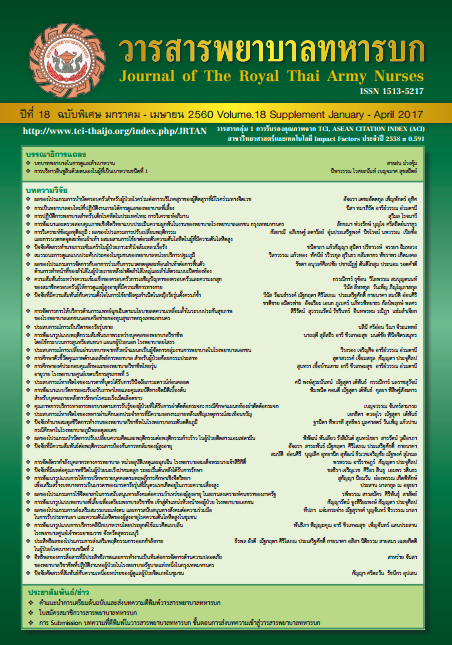การจัดการการให้บริการด้านการแพทย์ฉุกเฉินตามนโยบาย ลดความเหลื่อมล้ำในระบบประกันสุขภาพของโรงพยาบาลเอกชนนอกเครือข่ายกองทุนสุขภาพกรุงเทพมหานคร
Keywords:
การจัดการ, บริการด้านการแพทย์ฉุกเฉิน, โรงพยาบาลเอกชน, Management, Medical emergency services, Private HospitalAbstract
การวิจัยครั้งนี้มีวัตถุประสงค์เพื่อศึกษาการจัดการปัญหาอุปสรรคและหาแนวทางการจัดการที่มีประสิทธิภาพในการให้บริการด้านการแพทย์ฉุกเฉินตามนโยบายลดความเหลื่อมล้ำในระบบประกันสุขภาพ ของโรงพยาบาลเอกชนนอกเครือข่ายกองทุนสุขภาพ กรุงเทพมหานครเป็นการวิจัยเชิงคุณภาพ โดยเลือกโรงพยาบาลแบบเจาะจง คือเป็นโรงพยาบาลเอกชนประเภททั่วไประดับตติยภูมิและสมัครใจเข้าร่วมโครงการวิจัย จำนวน 5 แห่งทำการเก็บข้อมูลด้วยการสัมภาษณ์แบบเจาะลึกผู้บริหารโรงพยาบาล จำนวน 6 ท่าน ทบทวนเอกสารที่เกี่ยวข้อง แล้วนำมาวิเคราะห์โดยการแจงนับแนวคิดและการตีความทดสอบยืนยันด้วยการตรวจสอบแบบสามเส้า ผลวิจัยพบว่า 1) ด้านการจัดการ มีการวางแผนกำหนดเป้าหมายการทำงานโดยยึดหลักวิชาชีพภายใต้มาตรฐานเดียวมีระบบการคัดกรองผู้ป่วยฉุกเฉิน การตรวจสอบสิทธิ์การรักษาพยาบาลเพื่อการส่งต่อผู้ป่วยกลับโรงพยาบาลต้นสังกัดภายหลังจากอาการปลอดภัยแล้ว มีการประชุมระหว่างผู้บริหารโรงพยาบาลกับหัวหน้าหน่วยสร้างวิสัยทัศน์ขององค์การในการให้บริการด้านการแพทย์ฉุกเฉิน และการควบคุมคุณภาพโรงพยาบาลที่เป็นมาตรฐานสากล ระบบการตรวจสอบภายใน ระบบบริหารจัดการสมัยใหม่ 2) พบปัญหาการจ่ายค่าชดเชยการรักษาพยาบาลที่ไม่คุ้มทุน ปัญหาเกณฑ์การประเมินเพื่อคัดแยกระดับความรุนแรงของการเจ็บป่วย ประชาชนไม่เข้าใจนิยาม “ฉุกเฉิน” และหาช่องโหว่เพื่อเบิกค่ารักษาพยาบาลจากกองทุน และไม่สามารถส่งตัวผู้ป่วยกลับโรงพยาบาลต้นสังกัด 3) แนวทางการจัดการการให้บริการด้านการแพทย์ฉุกเฉินที่มีประสิทธิภาพคือ ควรให้ภาคเอกชนมีส่วนร่วมในการร่างนโยบาย ปรับปรุงระบบการนำส่งผู้ป่วยฉุกเฉิน สร้างความเข้าใจหลักเกณฑ์การประเมินระดับความรุนแรงของการเจ็บป่วยฉุกเฉินและคำว่า “ฉุกเฉินรักษาฟรี” แก่ประชาชน ปรับปรุงระบบการย้ายผู้ป่วยกลับโรงพยาบาลต้นสังกัด และปรับอัตราการจ่ายค่าชดเชยให้เหมาะสม
Medical Emergency Services Management Under System Unequality Reduction Policy Among the Outside Private Hospitals of Bangkok Health Health Fund’s Network
This researchaims to study management, problems and study servicemanagementefficientguidelineundersystem unequalityreduction in medical emergency services among private hospitalsoutside Bangkok health fund’s network. This research was qualitative design and selected fivehospitals case by purposive sampling of tertiary care services hospitals and agreed participate in this research.This research used in-depth interview 6 hospital executives with review the document. The data were analysed by conceptual enumeration, interpretedand validated by triangulation method.
The research found: (1) The plan was to defined the goals which base on principle professional standard. There are emergency patient triage system. Medical right verifying system, for referral the patient with good condition to the origin hospital. The meeting between management team and head of departments. Create a vision in medical emergency service. The new management systemsand internal audit were applied to maintain the hospital’s international standard. (2) Found the problems a) the medical compensation is not cover the expense, b) the criteria use to identify the emergency condition are not well-defined, c) the people do not understand scope of the word “emergency” and tries to find loophole to take the compensation from health fund, and d) patient cannot be referral to the origin hospital. (3) Efficientguidelinein medical emergency servicesmanagement a) private sector should take part in policy formulation b) to improve the patient delivering system, c)understandingcriterion that used to classify the level of patient emergency condition and the definition of “Free Emergency Care” to public, d) to develop the patient referral system to the origin hospital and e)to have a reasonable compensation.
Downloads
Downloads
How to Cite
Issue
Section
License
บทความหรือข้อคิดเห็นใดใดที่ปรากฏในวารสารพยาบาลทหารบกเป็นวรรณกรรมของผู้เขียน ซึ่งบรรณาธิการหรือสมาคมพยาบาลทหารบก ไม่จำเป็นต้องเห็นด้วย
บทความที่ได้รับการตีพิมพ์เป็นลิขสิทธิ์ของวารสารพยาบาลทหารบก
The ideas and opinions expressed in the Journal of The Royal Thai Army Nurses are those of the authors and not necessarily those
of the editor or Royal Thai Army Nurses Association.






